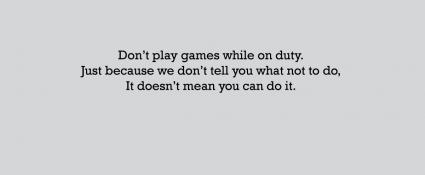
I mentioned in my last post that I was in Sun Valley last weekend. We stayed at the very nice Sun Valley Inn. It was a great location and a great place to spend a weekend away.
I was getting my bike out of the bell closet one of the days and I noticed a sign. The sign told the bellmen and the valet that they are not allowed to play games on duty.
Normally, customers wouldn't see that sign because it was an employee only area but I had just followed the valet in. At first I thought it was a little funny that they had to have that sign. It didn't really occur to me why they had to have that sign.
Later that same day, I went to pool. I don't usually expect a pool attendant. I'm not usually at hotels that are fancy enough to need them. I needed to interact with the pool attendant a couple of times (because apparently when you are rich enough, you can't get your own towels). Each time I had to interact with her, I felt like I was tearing her away from her phone while she was texting or doing Facebook or checking her email or something.
Even though I didn't need an attendant, the fact that there was an employee there that seemed to think her phone was more important than her customer frustrated me a little bit.
Yesterday I was at a location for a small workshop. At the venue there was only one employee. Each time I needed some help, I had to interrupt her phone call on her cell phone to get help. She was the only employee at the venue and her phone call was far more important than the task at hand. That task was taking care of her customers.
It's very possible that in both situations what they were doing was very important to them. It's very possible that in each of their situations they were conducting business. In fact, I've been to locations where the phone was ringing and the person helping me asked me to wait while he or she answered the phone.
The problem all the scenarios have is the understanding of who your most important customer is.
Your most important customer is the one standing in front of you right now. Just as it is rude to interrupt someone when they are talking to someone else, it's rude to allow yourself to be interrupted when you are talking to or should be taking care of your most important customer.





